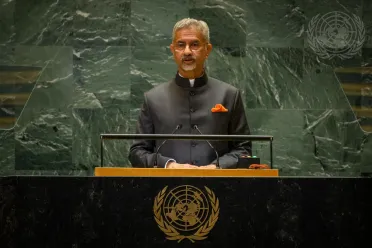Statement
Statement summary
SUBRAHMANYAM JAISHANKAR, Minister for External Affairs of India, citing global challenges that have led to a fractious, polarized and frustrated world, asked: “If the world is in such a state, this body must ask itself: how has this come to pass?” “The problems arise from a combination of structural shortcomings, political calculations, naked self-interest and yes, disregard for those left behind,” he said, and thus Member States must seriously and purposefully address the challenges at hand to effect change. India has sought to respond in many ways, foremost by focusing on the issues of the vulnerable, women, farmers and youth, as well as by fashioning targeted policies and initiatives for their betterment. Citing assured access to piped water, electricity, cooking gas and new homes, as well as a narrowing gender gap in health, education and the workplace, he noted that a third-term Government has also prioritized skilling its youth. Further, it is expanding employment and entrepreneurship opportunities, including through stronger training and large-scale financial incentives. Small businesses have received 495 million Mudra loans in the last decade, with a majority allocated to women.
India is also “creating templates that are replicable elsewhere” through its digital delivery or enhancing the quality of governance and public services, he said. “A digital public infrastructure and a people’s pharmacy are today examples of what India can readily offer” and “an alternative vision where technology is used to empower, not to dominate”. To encourage the Global South to voice its shared concerns and come together, his country has convened three Global South Summits, the most recent in August, he said. Further, India is undertaking projects in 78 nations, providing resources to neighbours, as well as humanitarian assistance and disaster relief. The impact and transformative impact of the digital is evident in the daily lives of Indians who benefit from the efficient and large-scale delivery of public benefits, from nutritional support and housing to energy and health. Detailing other digital advancements, he said: “That is India’s experience and India’s relevance.” “Such leap-frogging possibilities, coupled with people centric policies and visionary leadership, can be real game-changers,” he added.
Noting the unfairness of the current globalization model, which has caused many to get left behind, he stressed: “There are economic answers, just as there are social ones.” “The UN has always maintained that peace and development go hand in hand. Yet, when challenges to one have emerged, due regard has not been given to the other,” he said. While many countries get left behind due to circumstances beyond their control, some make conscious choices with disastrous consequences, he said, pointing to Pakistan, its neighbour, as a “premier example”. “A dysfunctional nation coveting the lands of others must be exposed and countered.” Pakistan’s cross-border terrorism policy will never succeed and can have no expectation of impunity, he stressed, emphasizing that the only solution is for Pakistan to vacate the illegally occupied Indian territory and abandon its “long-standing attachment to terrorism”. The global order is inherently pluralistic and diverse. The UN began with 51 members and expanded to 193. “The world has changed profoundly and so have its concerns and opportunities,” he said, emphasizing that the UN must the central platform for finding common ground. But, “it cannot be, by remaining anachronistic”, he added.
India’s External Affairs Minister Subrahmanyam Jaishankar said the world stands fractious, polarized and frustrated amid war, unfair trade practices, climate change and food and health insecurity. Trust has eroded, processes have broken down and countries have extracted more from the international system than they have put in it, enfeebling it along the way.
*****
“Conversations have become difficult, agreements even more so,” he said. “This is surely not what the founders of the UN would have wanted for us. Reforming multilateralism is, therefore, an imperative.”
The General Assembly must ask itself “how has this come to pass?” he said.
“Every change must begin somewhere, and there is no better place than where it started,” he continued.
“We, the Members of the United Nations, must now seriously and purposefully address ourselves to that task. If we carry on like this, the state of the world is only going to get worse, and that could mean that more of us are going to be left behind.
For its part, India has sought to respond in a variety of ways, including targeted policies and initiatives focused on issues of the vulnerable, women, farmers and youth, from assured access to piped water, electricity, cooking gas and new homes to financial support for food producers.
India has also expanded employment and entrepreneurship opportunities, created digital infrastructure for public services and convened three Global South summits while also responding to pressing needs in 78 nations.
“In these troubled times, it is necessary to provide hope and rekindle optimism,” he said.
“When India lands on the moon, rolls out its own 5G stack, dispatches vaccines worldwide, embraces fin-tech or houses so many Global Capability Centres, there is a message here. Our quest for a Viksit Bharat, or developed India, will understandably be followed closely.”
However, challenges persist, he said, underscoring that many countries get left behind due to circumstances beyond their control. But some make conscious choices with disastrous consequences, with one example being neighbouring Pakistan, “a dysfunctional nation coveting the lands of others”. As such, he stressed, “Pakistan’s cross-border terrorism policy will never succeed.”
When it comes to deciding on key issues, large parts of the world cannot be left behind, he said, emphasising that an effective, efficient UN must be more representative and fit for purpose.
“Let us, therefore, send out a clear message from this UN General Assembly session: we are determined not to be left behind,” he said. “By coming together, sharing experiences, pooling resources and strengthening our resolve, we can change the world for the better.”
Full statement
Read the full statement, in PDF format.
Photo

Previous sessions
Access the statements from previous sessions.
